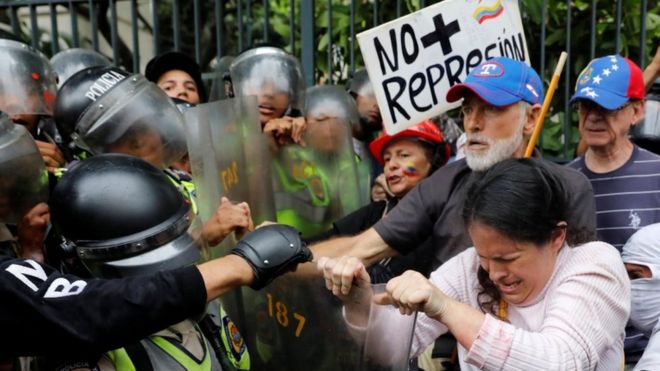Thousands of elderly Venezuelans have taken to the streets of Caracas and other cities to protest against the government of Nicolas Maduro amid a worsening economic crisis.
Police blocked access to a main road in the capital and used pepper spray to try to control the crowd.
Protesters threw punches and demanded respect from police.
Venezuela is facing a shortage of many basic items, including medicines and medical equipment.
Many feel that elderly people have been particularly affected by the crisis in the health system.
- Venezuela’s week of protest in pictures
- ‘Death’ on the streets of Caracas
- Venezuelan military ‘detaining citizens’
In another development, Mr Maduro has sacked his health minister after she released official figures showing a sharp rise in child mortality and maternal deaths over the past two years.
Antonieta Caporale, a gynaecologist, had been in the post for only four months and was replaced by the Vice-Minister of Hospitals, Luis López.
A university town, Merida is used to student protests. But on Friday, a steady stream of pensioners marched to the public prosecutor’s office.
One elderly man summed up their grievances: “The government is killing us in three ways. We’re dying of lack of food, we’re dying of lack of medication and they’re killing us at the protests.”
Another woman held up a sign reading: “Today I’m turning 60 and for the first time I don’t have enough for a cake.”
Florentino Montilba, 75, said he was taking to the streets because “this is the last option they’ve left us with”.
“If need be, we’ll die here on the streets,” he said.
The march was diverted but it eventually reached the office of Venezuela’s ombudsman, where the protesters accused the security forces of brutal suppression.
At least 39 people have been killed since the current wave of protests began six weeks ago.
The unrest was triggered by a Supreme Court attempt to take over powers from the opposition-controlled National Assembly on 29 March.
It reversed its decision a few days later, but by then the opposition had seized the momentum.
BBC
 Q FM Africa's Modern Radio
Q FM Africa's Modern Radio
